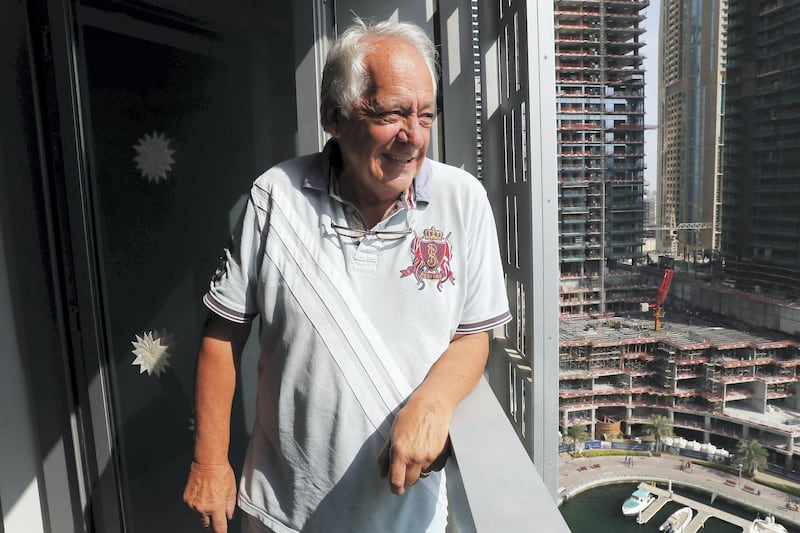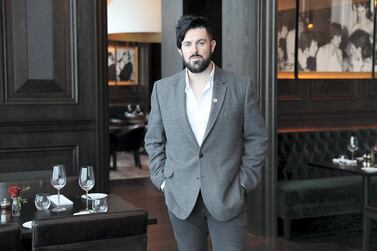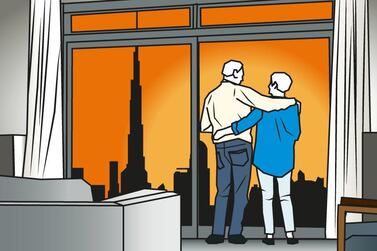Former UK lawyer John Felton worked in conveyancing, general litigation, childcare and criminal law before retiring to Dubai with his wife Heinke, 73, a former teacher and examiner, in December 2006. Mr Felton, 78, parent to two adult sons, later took inspiration from bedtime stories invented for his three grandchildren in Arabian Ranches to author an illustrated kids book series based around a fish called Henry. The retiree now lives in Dubai Marina.
How did your upbringing shape your attitude towards money?
A I was born near Birmingham. For the first six years my father was away in the Second World War and I didn't see him much. He was an electrician who became an estate agent. My mother was a housewife. I've got an older and a younger sister. There was austerity, so that coloured my upbringing. I got a scholarship to boarding school until I was 15. For pocket money I'd get six old pennies a week – I guess, under 20 fils. When home, I would mow the lawn and help.
After I started working I used to send money home each month – until the day my parents died they wanted to repay that and made provision to. Now, if we visit my son, he orders an Uber. I feel embarrassed he’s paying for it. That’s something that comes from childhood.
What were you paid in your first job?
I was 15 and was a waiter in a hotel. Pay was pretty low but we did quite well on tips. I was once tipped £5 (Dh23), which in today's money is probably worth nearly £100. I left university and became articled to a firm, paid £7,10 shillings a week (equivalent to £155 today). My digs cost £5 a week, including food. Not a lot left over. I then attended law college and had to borrow £75 for six months. I might have been near the border but I was never on the borderline.
Why did you move to Dubai?
Primarily, for family – to come and help. We were going to move to France when I retired, but our son, a CEO, was working here and said, 'Why don't you buy here?' We were one of the first residents on The Palm. Our son and his wife had a third child after we arrived. We ended up, very luckily, getting a two-bedroom flat on the Shoreline. We then moved to a two-bedroom apartment in Cayan Tower in Dubai Marina four years ago.
How did changing retirement location affect your budget?
It wasn't a big financial shock in the sense that we hadn't planned for retirement, it sort of happened and we fitted things together as we went along. Going to France we would have spent a lot renovating a property. I was never a lawyer who concentrated on earning lots of money, but we'd built up nest egg in various departments. And I haven't sat down and worked out figures, but if you are cautious you can live quite cheaply in Dubai. We have somewhere to live – service charges are obviously something we look at – and we eat out fairly regularly in small restaurants, quite often share a meal because we're older and don't need larger portions. We live quite well without spending massively. We have a small UK pension, which pays for our health insurance.
Do you have any financial regrets?
We were buying two apartments in a development, overlooking the sea in Ras Al Khaimah in 2009 and didn’t recognise the man [developer] as a con man. He took a substantial amount of money; Dh900,000 [deposit]. Where it went is still a mystery. It was a big hole in our budget. To this day it has never been built.
What is your best investment?
The Palm apartment - that is basically our pension. It provides (rental) income and there’s considerable capital appreciation, although it’s been up twice as much as it is now.
Do you have a philosophy towards money?
As long as I have enough, I’m all right. By enough, I don’t mean masses. I’m not a brands person, but enjoy having something of quality. Money doesn’t matter; it’s family, friends - as long as you are happy with that and have a crust and your walls…
What’s your most cherished purchase?
A chalet in Austria; we've got a small flat and a three-bedroom flat, bought in 2003 for €240,000 (Dh1.05m). I had money from selling my practice and Heinke had saved quite a bit. She's the financially aware person in the couple. We go there in summer, 1,300 metres up, clean air, a stream at the bottom you can drink water out of. It provides balance.
The plan was let the place for skiing in winter but be cost neutral, we balance the books. It’s certainly appreciated in value, but not massively.
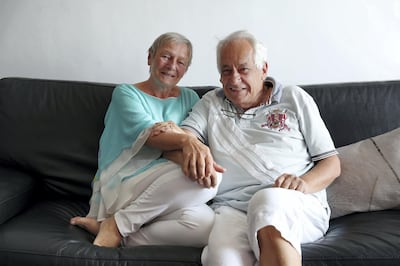
Are you a spender or a saver?
I’m a spender, but not a massive spender. I don’t go for clothes with brands on. I’ll go out for a meal more often than Heinke will. She’s very cautious and likes to spend on things she really appreciates. She’s my accountant, guide and mentor where money’s concerned.
Where do you save?
I have two bank accounts here; money from the rental of the Palm goes into one. We’ve saved a bit over the last year, but rents are going down, which is our primary income. We have another account in Austria; it services the flats and we use that money when we’re there. I had to supplement it this year as we had a new heating system.
Do you prefer to pay in cash or credit card?
In cash or debit card. I’m just old fashioned, I suppose.
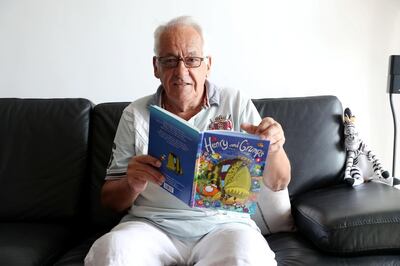
Do you plan for the future?
Yes, in the sense that we look at potential problems like disablement. I miss England but cannot envisage finding somewhere in which I will be as content or conveniently able to live as here. We have a metro and taxis, and one of the important things for an older person is to be warm. At one stage it may be that we need a carer. We could possibly afford it, whereas in the UK you would be hard-pushed to. My health is quite robust but there will come a time when I need help. By then, Dubai would probably be a lot cheaper. A big thing for retirement here is ease of service, getting things.
We are looking to take one of these new investor retirement visas. We started out with a Nakheel visa, because we had property. Then, as we were genuinely here to look after grandchildren, we’ve remained on our son’s visa ever since.
Do the books provide an income?
The first book I wrote was published three years ago; Henry Had Terrible Hiccups. The only commercial aspect was to sell enough to cover the cost of printing and the illustration. I use money from sales to finance the next one. There's a deficit of Dh50,000, but I've a lot of books which, if sold, will cover that easily. It's a labour of love.
If you won Dh1m what would you spend it on?
Our 50th wedding anniversary in 2017 lacked a number of people who couldn't come for various reasons. I would spend a chunk renting my son's holiday home on Loch Lomond, in Scotland, and pay airfares for our friends to go. I would also promote the next book, Henry & The Pink Flippers, a story about sea pollution. I think that's the most important one I've done.
